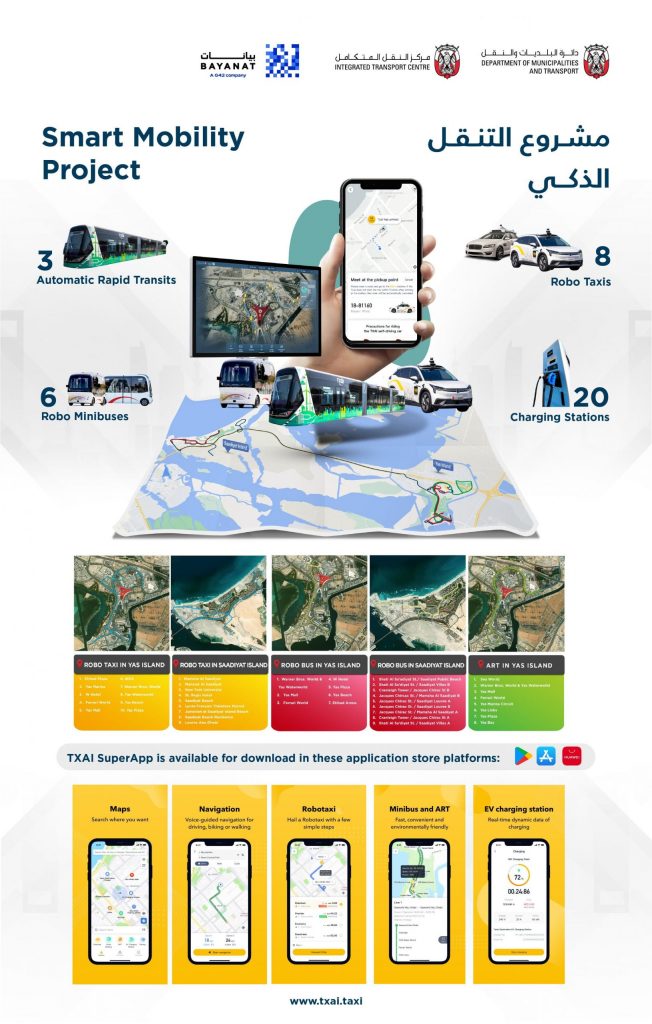The Department of Municipalities and Transport (DMT) and the Integrated Transport Centre (ITC) in Abu Dhabi recently announced the start of the second phase of operations of the Smart Mobility project. In keeping with the vision of the wise leadership to make Abu Dhabi’s cities smarter and more sustainable, and as part of efforts to build a smart mobility system that supports development across various sectors and facilitates the mobility of residents and visitors to the emirate.
The Smart Mobility Project, a partnership between the DMT, the ITC, and Bayanat, an ADX listed public company with majority shareholding by G42 that specialises in AI-powered geospatial information, will be formally launched during the Formula 1 Etihad Airways Abu Dhabi Grand Prix in 2022.
According to the Integrated Transport Centre, the project is a component of Abu Dhabi’s smart mobility strategy, which calls for a shift to knowledge- and innovation-based smart and sustainable transport solutions. This effort supports efforts to create future-proof cities and achieve sustainable development in the emirate. In order to develop a smart, integrated, and sustainable transportation system and support the objectives of the wise leadership and their vision for the future, this is achieved through collaborating closely with important stakeholders in both the public and commercial sectors.
According to the ITC, smart mobility paves the way for a new phase in the development of an environmentally friendly and sustainable transportation sector, which draws more investment into the economy and tourism. This is particularly true given that the transportation sector is one of the most significant drivers of growth, supporting businesses and giving economic activities in many other sectors a competitive advantage.
Mr. Hasan Al Hosani, CEO of Bayanat, said, “When we think of the future, we think of how Bayanat can empower and enhance the public transport system with intelligent, innovative solutions. Autonomous vehicle technology will transform mobility in Abu Dhabi into something more efficient and attractive to the public. Through our strategic partnership with the Integrated Transport Centre, we are making intelligent, eco-friendly and safe transit accessible for all to serve the community better. This is just the beginning of what is to come as we continue to work to realize the potential of advanced technology in our everyday lives.”
The smart mobility system on Yas Island and Saadiyat Island currently includes a fleet of 17 vehicles, including eight /TXAI/ autonomous vehicles, the first fully automated self-driving taxis in the UAE which were launched last November. It also includes 6 Mini Robobuses, in addition to 15 charging stations that were added to the Yas and Saadiyat Islands network. The system will also include 3 Autonomous Rapid Transits (ART) in Yas Island, an improved rapid transport system operating without mass transport train system or rails. Customers can download and install the “TXAI” app to book and track their rides.
Mamsha Saadiyat, Al Manarat, NYU Abu Dhabi, The St. Regis Hotel, Saadiyat Beach, Theodore Monod French International High School (Lycée Français International Théodore Monod), Jumeirah, Saadiyat Beach Residences, and Louvre Museum Abu Dhabi are among the new stations on the self-driving taxi route on Saadiyat Island. The service is available seven days a week from 8:00 am to 8:00 pm along a 47.5 kilometre route.
The Autonomous Rapid Transit (ART) system will offer services to Yas Island’s primary tourist destinations and business centres in its initial phase.
The goal of Abu Dhabi’s Smart Mobility Strategy is to create an eco-friendly and sustainable transportation sector. This is done by utilising modern technology to serve the community by improving the efficiency of the transportation system and aiding in the transition to smart autonomous transportation. This, in turn, lowers transportation costs, raises the standard of living in the Emirate of Abu Dhabi, and strengthens its position as one of the top global cities. Additionally, it aids in attempts to cut carbon emissions in accordance with the Paris Agreement and the UAE’s strategic programme Net Zero 2050 in order to accomplish the nation’s sustainable development goals.

